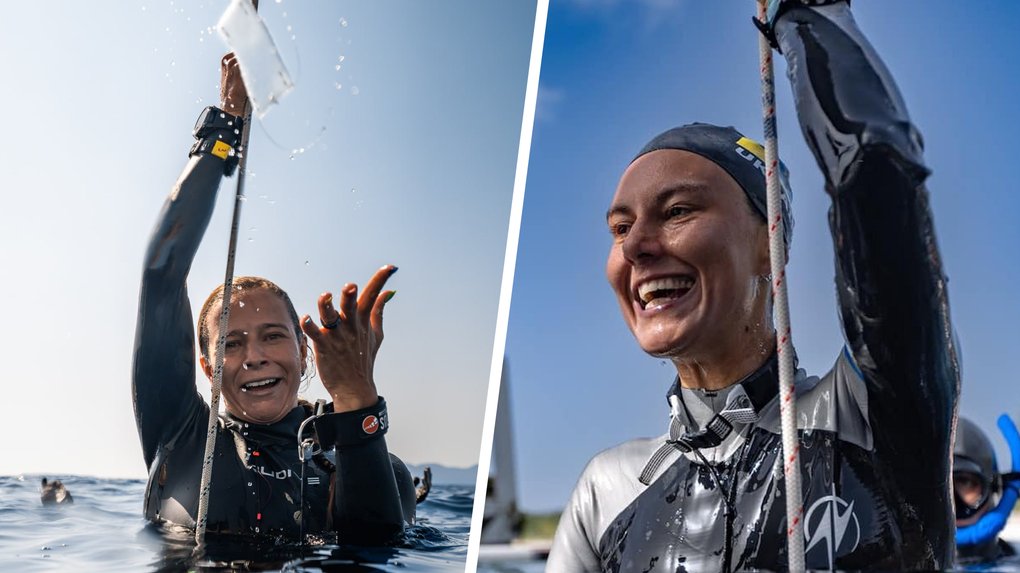Russia has bombed Kharkiv for nearly three years. The city sits 40 kilometers from the Russian border—close enough that residents often hear the launches before the sirens wail.
Yet this battered city just produced two world freediving champions in one month.
Nataliia Zharkova, 36, won gold at the World Freediving Championship in Greece in September 2025, diving 113 meters on a single breath. Two weeks later, fellow Kharkiv athlete Kateryna Sadurska, 33, set a new Ukrainian record at 103 meters with a monofin.
Both came from the same Kharkiv swimming schools. Both trained in facilities that took damage in the invasion's first days. Both represent what Russia has tried—and failed—to destroy: the Soviet-era Olympic training system that has made Kharkiv a powerhouse for generations.
Why Russia targets sports infrastructure
Aquarena, Kharkiv's Olympic swimming complex, suffered damage in February 2022. The strike was hardly random. Sports facilities built by Ukrainian coaches created cultural identity and international prestige—exactly what Putin's war aims to erase.
The complex was restored. Athletes kept training. And now, nearly three years into the war, Kharkiv's athletes are setting world records while training between air raid alerts.
This is the system that produced Yana Klochkova, Ukraine's four-time Olympic swimming champion. The same pools that trained her trained Zharkova and Sadurska. The same coaching methods. The same culture of excellence that refuses to die under bombardment.
Training between air raids
Zharkova moved abroad before February 2022. When she visits Kharkiv now, she trains with the local freediving team during windows between sirens.
During her summer 2025 visit, she caught a 90-minute break between alerts. "It's hard to train not knowing if your session will even finish," she says. "Every time you go, you have to accept that it might be interrupted."
Her first return hit hard. She arrived on a night train. The station lights were off. The air smelled like explosions—burned brick, wood, smoke. "That smell will always stay with me."
Despite everything, people adapt. Her summer visit showed resilience alongside destruction. Athletes still train. Coaches still teach. The pools still operate.
"People are still living," Zharkova says. "It's become the 'new normal,' sadly."
The system Putin can't kill
Kharkiv's dominance in swimming—and now freediving—comes from decades of Ukrainian coaching excellence. Nina and Oleksandr Kozhukh built a system that produced multiple Olympic champions. Nina was named the best children's coach in 1974.
That system survived Ukrainian independence, economic collapse, and revolution. Now it's surviving Russian bombardment.
The rivalry drove excellence. Kharkiv refused to be Ukraine's "second capital" behind Kyiv. "There's this internal competition," Zharkova explains. "Kharkiv always wanted to prove it's not the second capital, but the alternative capital."
That competition showed up in sports. Kharkiv and Kyiv teams constantly tried to outdo each other. "That gave a good boost and motivation for Kharkiv coaches to train strong athletes."
This is the cultural ecosystem Putin wants to eliminate. The Ukrainian identity forged through competition. The excellence that comes from refusing to accept second place. The institutions that create champions.
From bombed pools to world records
Zharkova spent ten years at Kharkiv's School of Olympic Reserve. The training gave her breath control, performance under pressure, body awareness—tools that translate directly to freediving.
"We—the kids from the 2000s—grew up into adult freedivers," she says. "That background made us strong athletes today."
She began freediving in 2008 at 19. By 2013, she was winning world championship medals. In 2017, she set two world records at the European Championships in Türkiye: 85 meters with fins and 65 meters without.
She also became the first Ukrainian woman and only the second woman ever to dive below the arch of the Blue Hole in Egypt on a single breath. The underwater cave in Dahab is one of the most dangerous freediving sites in the world.
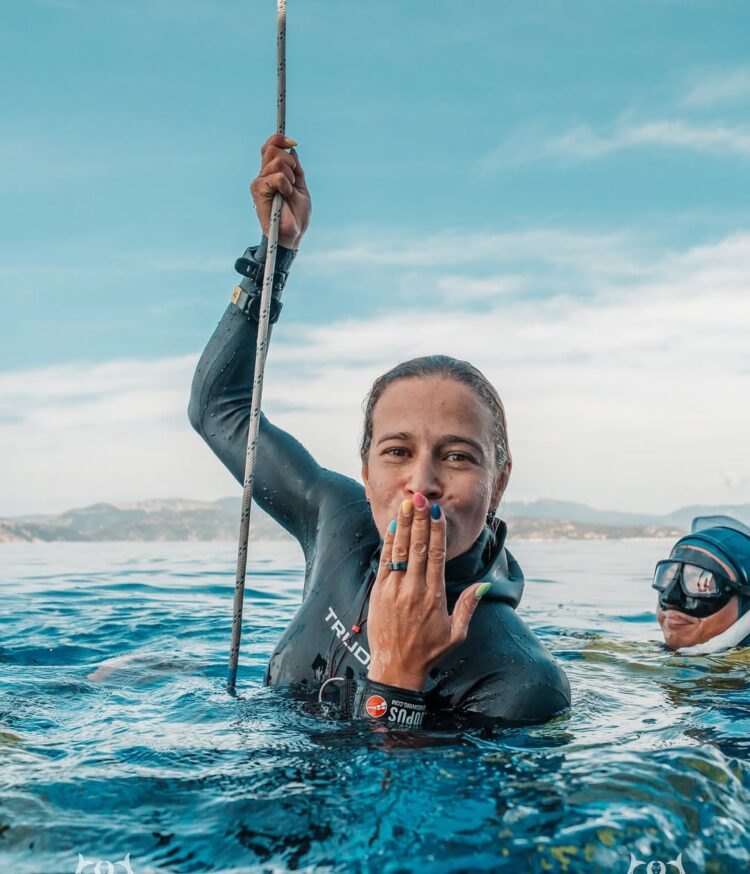
Sadurska followed a similar path from Kharkiv's pools to elite freediving. She holds the world record for constant weight without fins: 84 meters, set in 2024. That's diving nearly the length of a football field straight down, then swimming back up. On one breath. No fins at all.
Her October 2025 dive to 103 meters made her the first Ukrainian woman to reach that depth with a monofin.
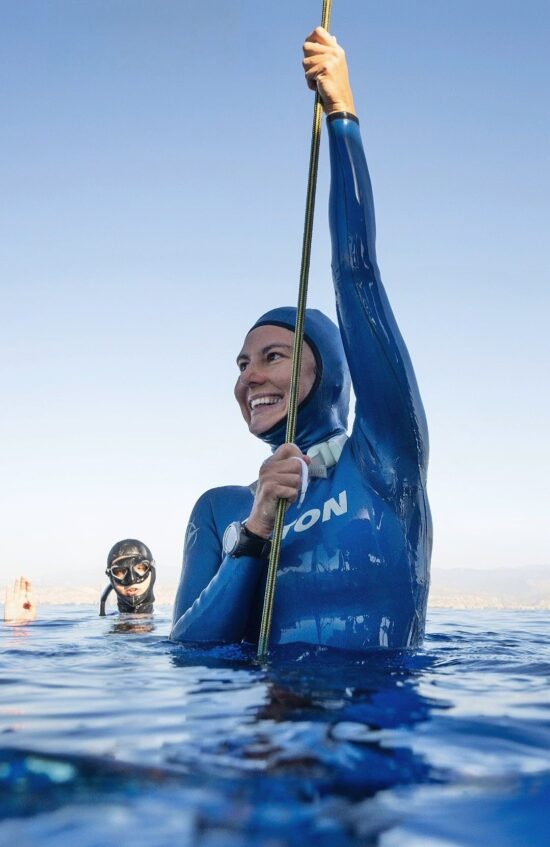
Watch the video as Corrie Nieto of Euromaidan Press talks to Nataliia Zharkova.
Competing as resistance
Winning means something different now. Before the war, these athletes represented themselves and their sport. Now every dive carries Ukraine's flag into international view.
"The main task at these competitions is to represent Ukraine in a dignified way," Sadurska says. "This is an opportunity to remind the world that the war in our country continues and that we are ready to fight, but we need support. It's also important to carry on and honor our fallen athletes."
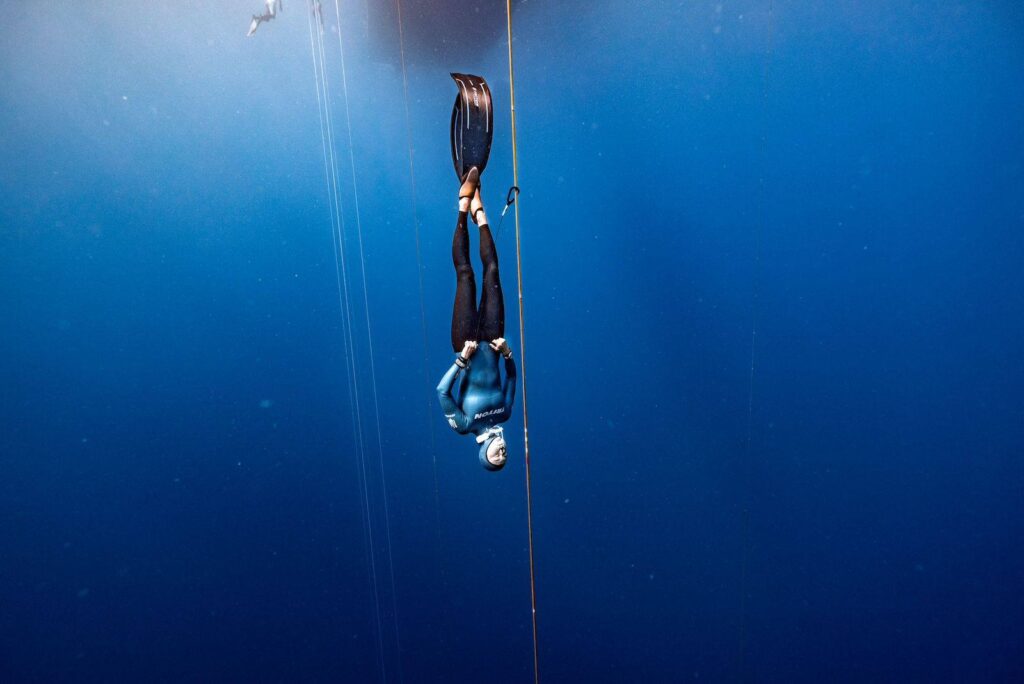
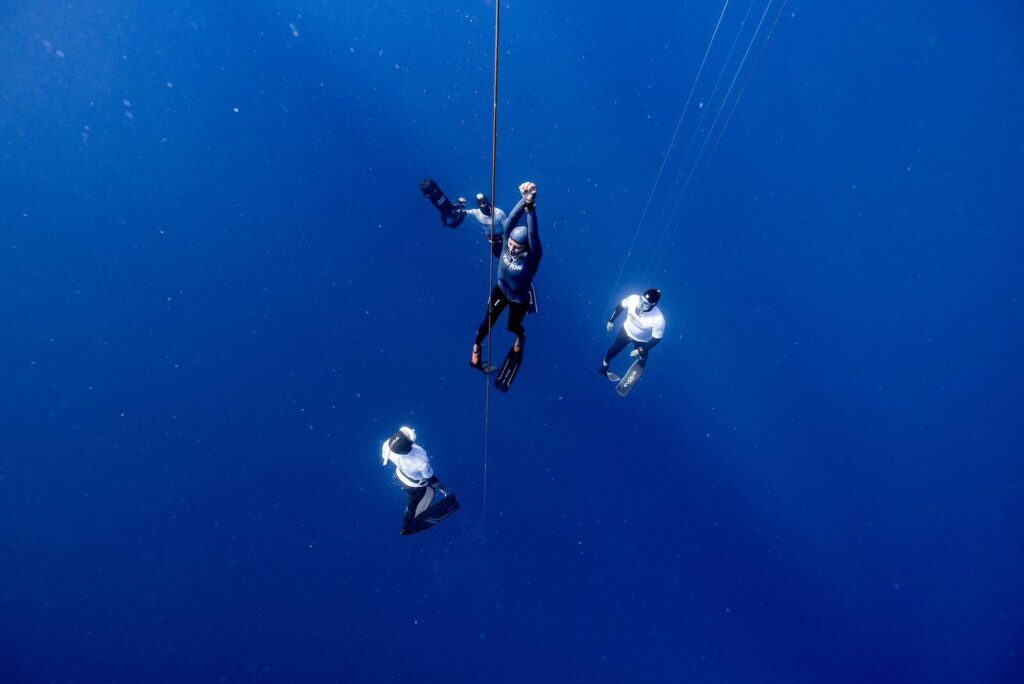
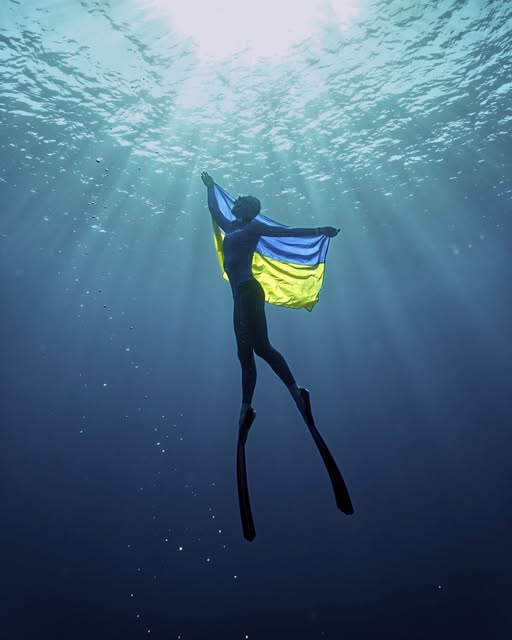
For Zharkova, the responsibility weighs. Before the war, she felt supported by her country. Now she competes for her country.
"Ukraine is torn apart, resources are scarce, but it's my job to stand there, to wear our colors, to sing the anthem, to show the trident, and remind the world that Ukraine is still here—still standing."
The contrast is stark. Zharkova now trains at Deep Dive Dubai, the world's deepest pool—60 meters of climate-controlled luxury. Meanwhile, Kharkiv athletes train between missile alerts in pools that were damaged and restored.
The September championship tested Zharkova's preparation. Twenty minutes before her dive, a safety diver got decompression sickness. The start was delayed. She had been training since November 2024 for this moment.
"After 17 years of freediving, I've learned to put up with it," she says. "I didn't stress too much." She completed the 113-meter dive and won gold. Her first competition in four years. Her fifth world championship.
Sadurska's October competition brought different challenges. "The first competitive day among women was scheduled for 5 October, but it was postponed to 6 October due to weather conditions," she explains. The 103-meter dive set a new Ukrainian record and earned her another world championship title.
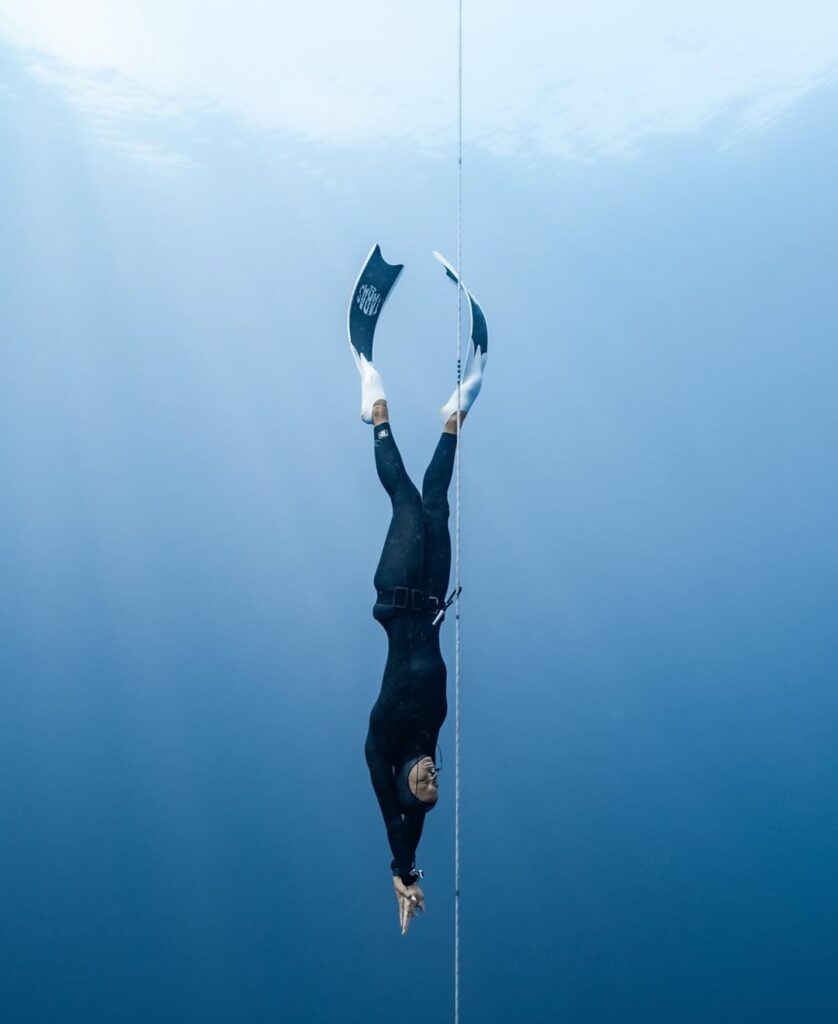
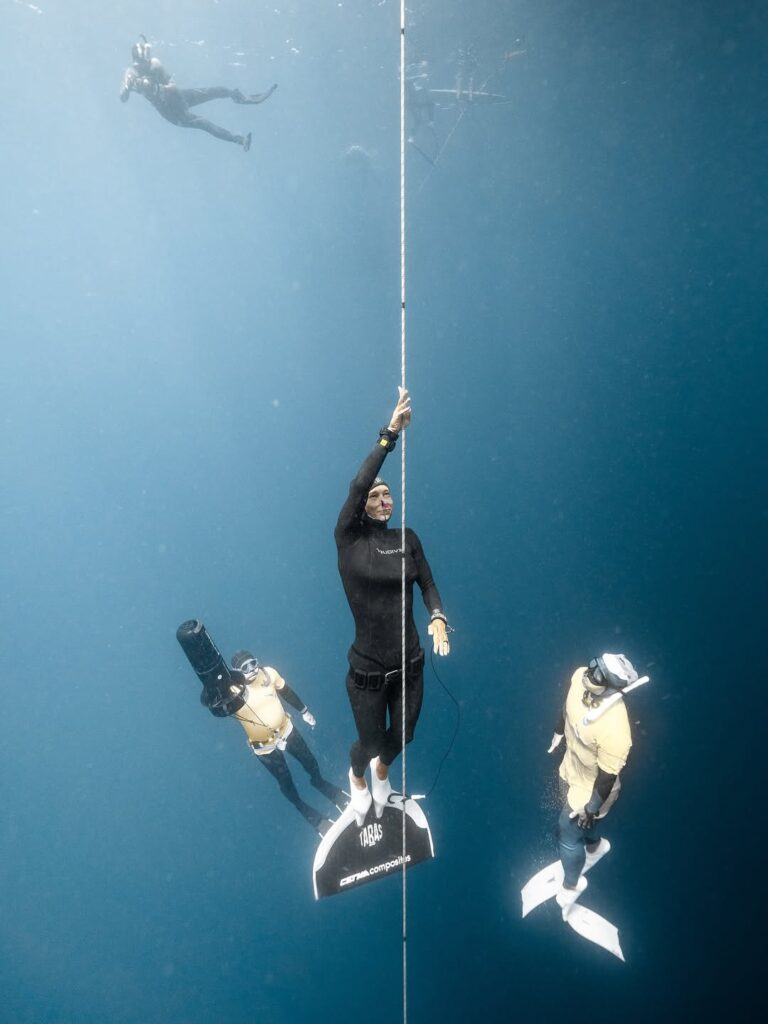
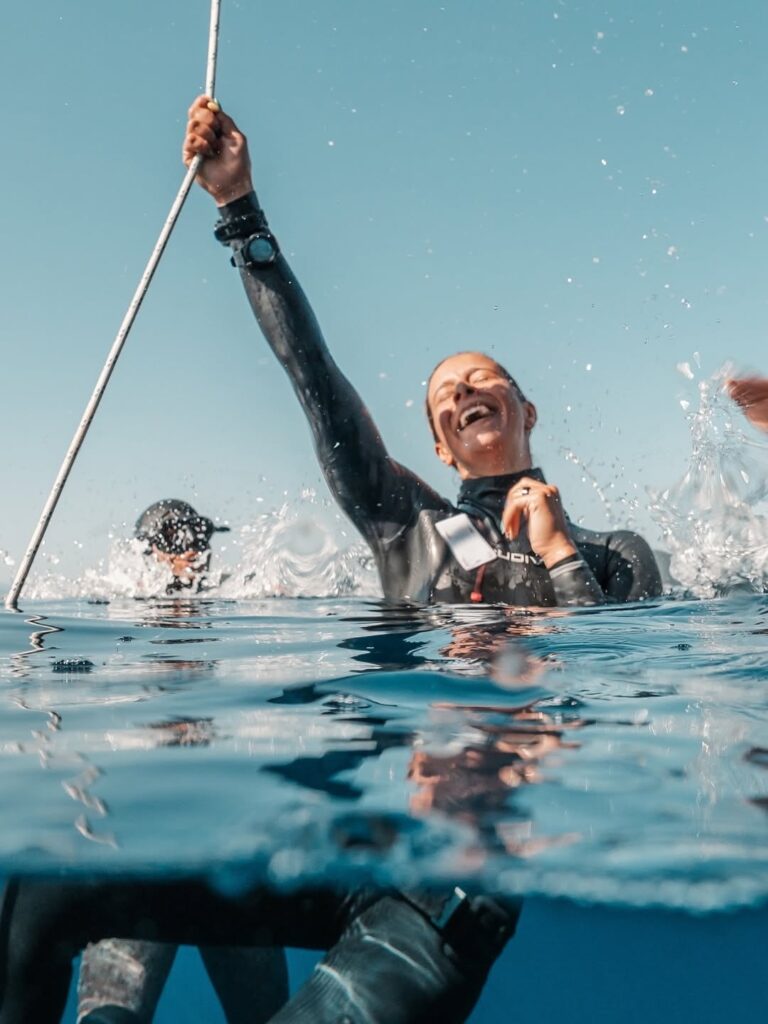
What Putin can't destroy
Kharkiv's swimming tradition spans generations. Yana Klochkova won her Olympic golds in 2000 and 2004. Zharkova earned her five world titles between 2013 and 2025. Sadurska's three world championships and multiple world records continue to add to the city's legacy.
All trained in the same pools. All learned from coaches in the same tradition. All represent what survives despite Russia's best efforts to erase it.
Russia bombs power stations, residential buildings, sports facilities. The city keeps training athletes. They keep winning world championships. They keep setting records.
Both divers are now working on projects beyond competition. Zharkova is developing breathing techniques based on freediving principles to help people overcome PTSD. "It's still in development, but I hope it can help."
The facilities are operating. Coaches are training. Athletes are competing between air alerts. The tradition continues—40 kilometers from the Russian border, in a city that refuses to surrender its identity.
"I believe one day life will return to something close to normal," Zharkova says. "Not the same as before, but peaceful."
For now, both keep diving. Two Kharkiv athletes, trained in pools Russia tried to destroy, dominating one of the world's most extreme sports. Nearly three years of bombardment couldn't kill what generations of Ukrainian coaches built.
They just proved it—from 100 meters underwater.




